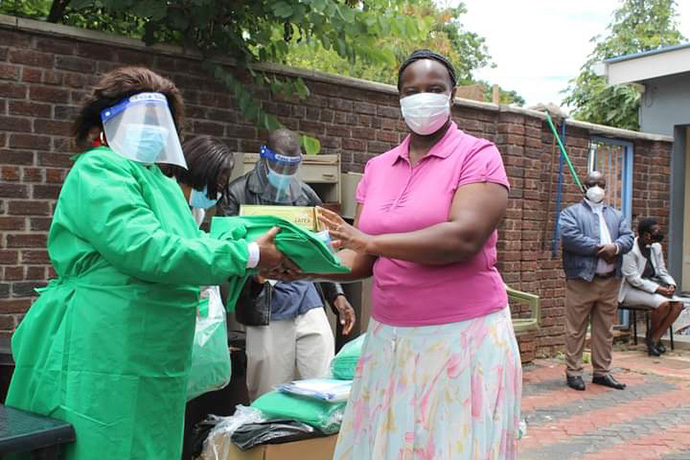
With COVID-19 deaths on the rise in Zimbabwe, pastors are trying to balance conducting funerals and being in ministry with grieving church members with the ever-present danger of contracting the virus and infecting their families.
According to Johns Hopkins University data, there have been 33,814 confirmed cases of COVID-19 in Zimbabwe, with 1,254 deaths between March 2020 and Feb. 3. Of that total, about 850 died in January alone, a record high amid a second wave of the coronavirus pandemic after the holiday season.
The Rev. Onismo Makwasha recalled a recent pastoral visit to Old Muture Mission Hospital. He saw a young man wheel his elderly father into the consultation room, only to find that the older man had already died.
“We were left in a dilemma,” Makwasha said. “We did not know if the dead man had the coronavirus as no tests had been done on him.”
Knowing that both he and a nurse may have been exposed to COVID-19, Makwasha still had work to do.
“I comforted the young man while doing my best to maintain social distancing,” he said. “This is the call to ministry.”
Makwasha’s case is not unique. Pastors across the Zimbabwe Episcopal Area face the grim task of comforting the bereaved and burying those who have died of complications from COVID-19.
Funerals have been identified as super-spreader events, and the Zimbabwean government has banned large gatherings, imposing a maximum number of 30 people for funerals.
“This new wave of the pandemic has brought fear and discomfort to the life and ministry of pastors,” said the Rev. Oscar Mukahanana, Harare East District superintendent.
“Pastors should have a full set of personal protective equipment if they want to conduct a funeral,” he continued. “It’s high time we hold funeral services virtually and leave the burial to health professionals.”
The Rev. Gift Kudakwashe Machinga of Cranborne United Methodist Church in Harare agreed.
“We have now convinced our congregants and departed from traditional ways of conducting funerals to the new culture,” he said. “We have resorted to online funeral services and reading most of the ritual prior to burial. This way, we won't spend much time at the gravesite.”
The Rev. Agbeth Mutanho of Seke South United Methodist Church in Chitungwiza described the second wave of the pandemic as “a catch-22.”
“The call of duty requires us to be there for our flock during their time of grieving,” he said. “Yet, the threat of being infected and endangering your life and the lives of your loved ones is very real.”
While the best solution would be virtual ministry, he added, many members lack technological expertise and equipment.
“COVID-19 does not respect our pastoral calling,” Mutanho said.
Clergy are not classified as front-line personnel, noted the Rev. Forbes Matonga of the United Methodist-related Nyadire Mission. However, “when people die,” he said, “they need dignified burials graced by pastors.”
Harare West District took the lead by equipping pastors and evangelists with PPE in January.
“Now we are in a better position to execute our duties at funerals,” said the Rev. Anesu Katsande, a newly appointed district superintendent.
United Methodists in the United Kingdom originally from the Mutasa Nyanga District purchased PPE for the 30 pastors in the district.
Michael Dengwani, who chairs the Chitungwiza Marondera District committee on superintendency, said they are encouraging all churches to provide PPE for clergy.
“We are ensuring gravesides are fumigated to protect our pastors,” Dengwani said, “and have arranged that funeral companies bring disinfected soil from areas outside the cemetery, which is used for the burial ritual.”
Government-imposed travel restrictions pose other challenges.
“Our Christian tradition and practices in relation to funerals have drastically shifted, making it difficult (for pastors) to execute their duties in person,” said Tapiwa Mupari of the Chitungwiza Marondera District.
The situation is especially difficult for pastors who started new appointments during the pandemic.
“Absence of physical church services means pastors are isolated with no moral support,” said Collen Chiwomadzi, lay leader of Bulawayo Central United Methodist Church. “The lockdown was imposed before they met their new congregations.”
Recently, the Zimbabwe Episcopal Area lost two prominent members to the pandemic.
Retired Africa University choir director and hymn writer Patrick Matsikenyiri, who died Jan. 15, influenced the global church as a singer, choral director, composer, hymnal editor, festival leader and professor.
The Rev. Maxwell Chambara, 72, was a trained farmer who served the Methodist Rural Industrial Development program (1968-88) at Old Mutare Mission. Later, he studied theology and served as a pastor for 24 years.
Chikwanah is a communicator for the Zimbabwe East Conference
News media contact: Julie Dwyer at (615) 742-5470 or [email protected]. To read more United Methodist news, subscribe to the free Daily or Weekly Digests.
Like what you're reading? Support the ministry of UM News! Your support ensures the latest denominational news, dynamic stories and informative articles will continue to connect our global community. Make a tax-deductible donation at ResourceUMC.org/GiveUMCom.



